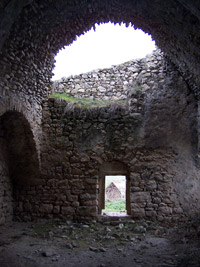The Chinar village of the Tavush Marz is one of the outskirts of Armenia. The house where we had stopped at was just a couple of hundred meters away from the Azeri front and, as the locals said, the Azeri were watching us.
“Will they fire?” I asked.
“They won’t fire, but it’s not good to be watched”.
The village we were staying in had many problems, but the number one problem was being watched. The villagers consider being watched by the opponent as the law of war, but what they don’t realize is that there is a lack of Armenian watchers. I’m not talking about the Armenian army and the guards. We have them and just like the Azeri, we’re also protecting that dividing line called the state border.
One of the villagers showed me the black earth on the plateau of the mountain and said:
“The man reaped and sowed the land while being watched. What else could he do?”
But really, what can the people who are luckily or by chance located in the target zone do?
In times like these, when the land can no longer be used, the state must free the villager from paying taxes and compensate. According to the villagers, the state was generous enough to free them from the taxes, but there was nothing mentioned about compensations. This is like adding salt to the wound because the villager is not freed of paying taxes, but rather his land is taken away from him. He doesn’t have to pay taxes, but he also doesn’t have the opportunity to work.
The villager showing me the black earth says that the villagers here have waited so long for the state compensations that they were forced to reap and sow, risking their lives. They do everything by hand because the opponent’s targets don’t allow them to use technical equipment (tractors). Besides that, no tractor driver is crazy enough to reap and sow the land.
The villagers use some words they have heard on television to describe how unjust the government is, but then they don’t even believe what they are saying. They say:
“Our state is just beginning to stabilize”, and then affirm that there is no state at all:
“The state is Yerevan, the second city/state after Luxemburg.”
On my way back to the city/state, excuse me, Yerevan, I was thinking about the people living in the target zone. The villagers who aren’t leaving their residencies not because they have no place to go, but rather because they feel that they have a mission to protect the land.
“It’s enough for them to see that we are here,” says one of the residents of Chinar. It’s hard to decide whether this is pride or despair. If you look at it from the opponent soldier’s perspective, it’s probably pride. But when you look at it from the Yerevan city/state perspective, what you have is despair.
On the road, I remembered my trip last summer to Martakert in Karabakh. I remember how the kindergarten principal was surrounded by over forty kids and was showing me the nearby fronts, teling me that the opponent is three kilometers away. What is this-heroism or despair? Neither heroism nor despair, especially as I remember how the kindergarten principal was calling on all the people of Martakert to return to their city on camera. He was telling them that there will be room in the kindergarten for all their children, as if the major problem was enrolling the students.
As for the principal of another school in a village of Martakert…Let me just stop there and say that the school was completely in ruins and there were barely ten students…That school principal actually spoke like a real Chinari villager and said that their state is new and they can’t demand many things. If she didn’t ask the government for a school with computers and student laboratories, perhaps I could understand the comformity. But she wasn’t even demanding a normal roof so it wouldn’t leak in the spring and fall.
After spending a day as a target, I lost sense of time. The person talking about being ignored by the state flew to medieval times in his mind when the Armenian Vahram prince was uniting the lands…Then he went on to the song entitled “Soldiers on the border”.
“We’re on this mountain, they’re on the other, the others are on the other mountain…”, said the residents of Chinar village as they pointed to the mountains. Then they said that “they” suffered a lot too and that “they” also couldn’t make use of the lands in the target zone.
“What will happen if one day you wake up and see that there are no fronts,” I asked a man who I picked up on the road and took to the neighboring Aygedzor village.
“What’s going to happen?…I go 170 kilometers from here to Sadakhlo. Sadakhlo will be closer, but the authorities make the decisions.”
The poor man didn’t know that before the “authorities” can make a decision, they have to know what it means to live being a target. Now they’ll say “who doesn’t know that? Our president used to be a soldier during a time when the city was under seizure. Perhaps, but experiencing war is not enough to understand the true meaning of peace. You must respect the individual.

